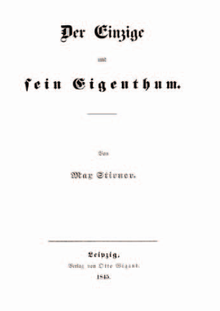The Ego and Its Own

Cover of the German language first edition, published in Leipzig in "1845".
|
|
| Author | Max Stirner |
|---|---|
| Original title | Der Einzige und sein Eigenthum |
| Translator | Steven T. Byington |
| Cover artist | Clifford Harper |
| Country | Germany |
| Language | German |
| Genre | Philosophy |
| Published |
|
| Media type | Hardcover, Paperback |
| Pages | 370 (Rebel Press ed.) |
| ISBN | (Rebel Press ed.) |
| OCLC | 23288029 |
| 302.5/4 20 | |
| LC Class | HM136 .S7413 1982 |
| Preceded by | Art and Religion (1842) |
| Followed by | Stirner's Critics (1845) |
The Ego and Its Own (German: Der Einzige und sein Eigentum; also translated as Me and My Own, or more accurately as The Individual and His Property) is an 1844 work by German philosopher Max Stirner. It presents a radically nominalist and individualist critique of, on the one hand, Christianity, nationalism and traditional morality, and on the other, humanism, utilitarianism, liberalism and much of the then-burgeoning socialist movement, advocating instead an amoral (although importantly not inherently immoral or antisocial) egoism. It is considered a major influence on the development of anarchism, existentialism, nihilism and postmodernism.
The first part of the text begins by setting out a tripartite dialectical structure based on an individual's stages of life (Childhood, Youth and Adulthood). In the first realistic stage, children are restricted by external material forces. Upon reaching the stage of youth, they begin to learn how to overcome these restrictions by what Stirner calls the "self-discovery of mind". However, in the idealistic stage, a youth now becomes enslaved by internal forces such as conscience, reason and other 'spooks' or 'fixed ideas' of the mind (including religion, nationalism and other ideologies). The final stage, 'egoism' sees the now adult individual freed from all internal and external constraints, attaining individual autonomy.
Throughout the book, Stirner applies this dialectial structure to human history (the Ancient and Modern worlds, and the Egoistic Future). Part one is a sustained critique of the first two periods of human history and especially of the failure of the Modern world to escape from religious modes of thinking. Stirner's analysis is opposed to the belief that modern individuals are progressively more free than their predecessors. Stirner sees moderns as being oppressed by ideological forces such as Christianity and the ideologies of the modern nation state.
...
Wikipedia
